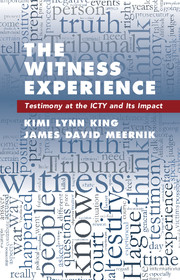Book contents
- Frontmatter
- Contents
- List of Figures page
- List of Tables
- Acknowledgments
- 1 Introduction to the Survey and Survey Methodology
- 2 Exploring the Gender, Ethnicity, and Trauma Characteristics of the Witness Sample
- 3 The Witnesses and Their Encounter with International Justice
- 4 The Witnesses and Human Security: The Social, Economic, and Security Consequences of Testimony
- 5 The Impact of Testifying
- 6 Perceptions of Justice
- 7 Conclusions
- Bibliography
- Index
6 - Perceptions of Justice
Published online by Cambridge University Press: 11 November 2017
- Frontmatter
- Contents
- List of Figures page
- List of Tables
- Acknowledgments
- 1 Introduction to the Survey and Survey Methodology
- 2 Exploring the Gender, Ethnicity, and Trauma Characteristics of the Witness Sample
- 3 The Witnesses and Their Encounter with International Justice
- 4 The Witnesses and Human Security: The Social, Economic, and Security Consequences of Testimony
- 5 The Impact of Testifying
- 6 Perceptions of Justice
- 7 Conclusions
- Bibliography
- Index
Summary
INTRODUCTION
The justice cascade (Sikkink 2011) and the increasing resort to international tribunals to confront the atrocities perpetrated during wars and government repression have led to increasing interest in studying the impact of these international institutions and what it means for international justice (Akhavan 2009; Barria and Roper 2005; Clark 2014; Gilligan 2006; Greig and Meernik 2014; Jo and Simmons 2016; Kim and Sikkink 2010; McAllister 2014; Meernik 2005; Simmons and Danner 2010; Stover and Weinstein 2004). In addition to their fundamental mission to provide justice and redress through legalized dispute resolution, these international courts have also been charged with advancing deterrence, promoting peace, and fostering reconciliation. Whether these are appropriate goals for judicial institutions far removed from the scenes of war and atrocity, with no tools beyond the power of their words of condemnation, and in the face of frequent international indifference to their mission, is debatable. Tribunals and their supporters have often embraced these ideals and used them to rally support for international justice. As former ICC President Philippe Kirsch declared, “By putting potential perpetrators on notice that they may be tried before the Court, the ICC is intended to contribute to the deterrence of these crimes.” Former Chief Prosecutor of the ICC Luis Moreno-Ocampo asserted that, “Experience has taught us that… law is the only efficient way to prevent recurrent violence and atrocities.” Indeed, as critics of international justice as a mechanism for conflict resolution have pointed out (Mendeloff 2004; Snyder and Vinjamuri 2003), there is no shortage of such expressive idealism from those inside and outside these courts. Is such optimism warranted? Can international justice be an effective means by which to deliver justice, punish the guilty, and deter future violations of international laws?
We examine the subject of the impact of international justice by analyzing the witnesses’ perceptions of the work of the ICTY. The perspectives of individuals about international justice are increasingly important in evaluating their prospects of success.
- Type
- Chapter
- Information
- The Witness ExperienceTestimony at the ICTY and Its Impact, pp. 149 - 177Publisher: Cambridge University PressPrint publication year: 2017



